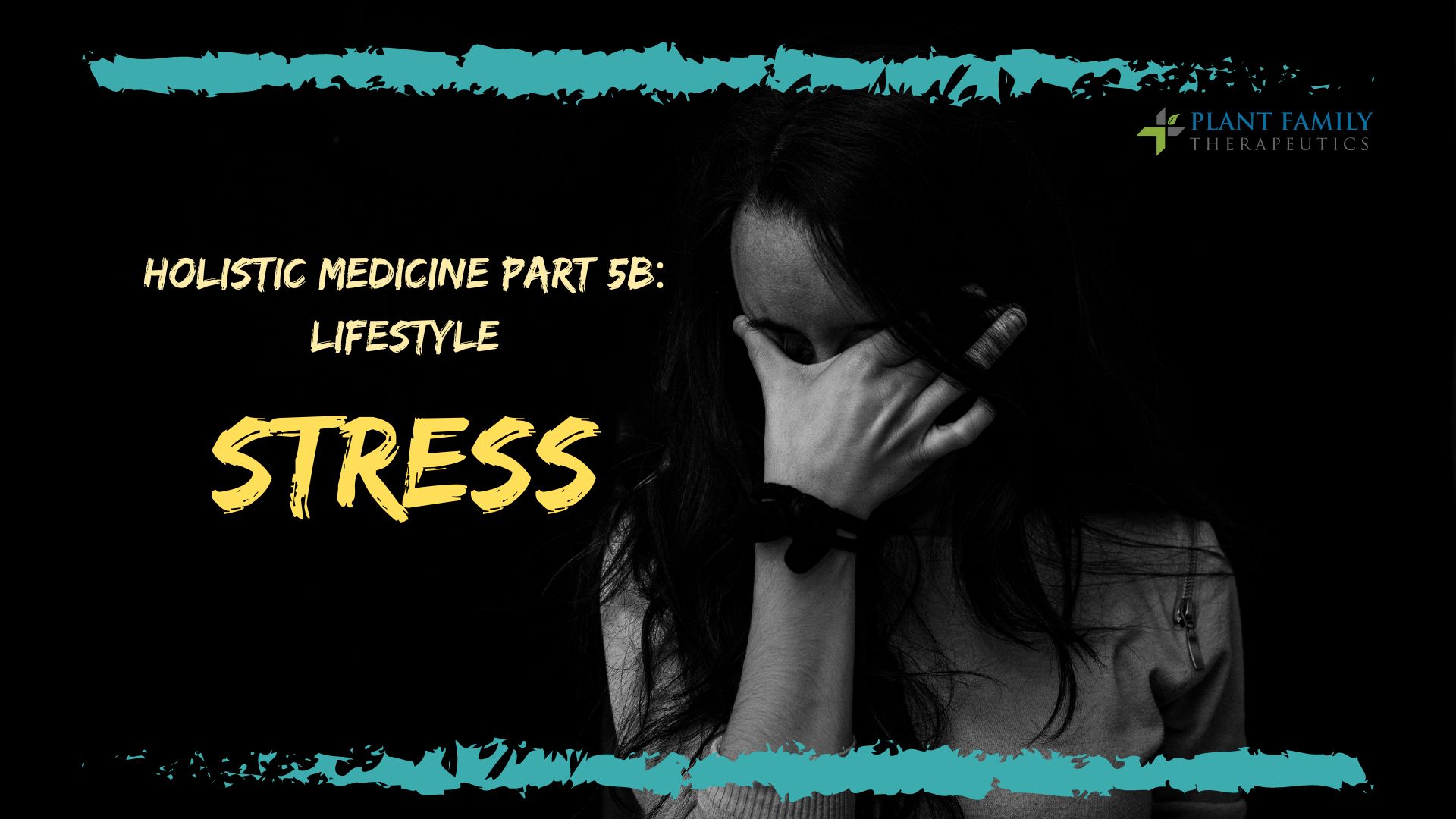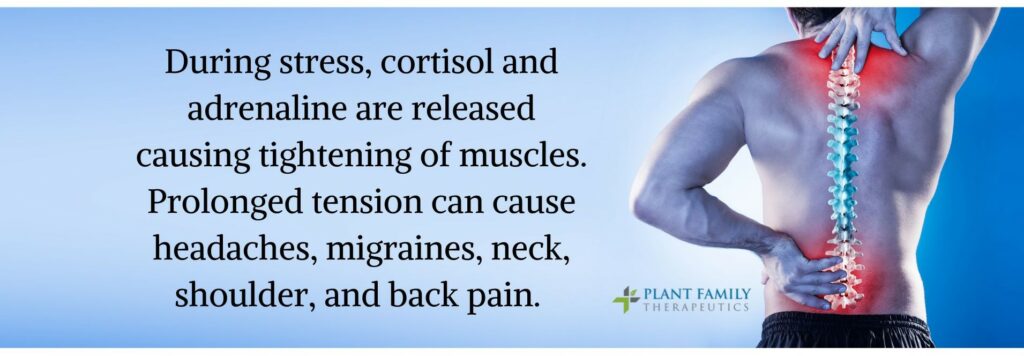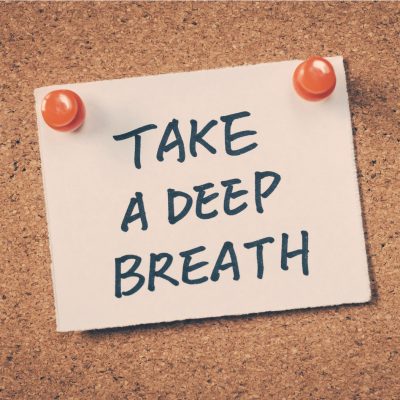This website requires you to be 21 years or older to enter. Please confirm your age below to continue.

In the last segment of holistic medicine, we started looking into lifestyles and how everyday foods and exercise impact our ECS. Here we will continue with lifestyles by looking at how stress affects our health and wellbeing.
Stress, the silent killer
Stress is any change in the environment that requires your body to react and adjust in response. The body reacts to these changes with physical, mental, and emotional responses.
Stress is a part of life and in some cases is a good thing. It can be helpful when it is a source of motivation in everyday situations, such as completing a project or taking a test. Stress causes a release of epinephrine that makes it easier to do tasks and enhances performance and problem-solving skills. This surge of epinephrine assists the body to deal with a threat or run for safety (think fight or flight).
However, research shows that when stress becomes long-term, it can negatively affect every system in the body. Over time stress can weigh you down more than you may realize. Chronic stress can become debilitating and can increase the risk of serious health complications, such as obesity, depression, and heart disease.
Stress also becomes harmful when people use alcohol, tobacco, or drugs to try to relieve their stress. Unfortunately, instead of relieving the stress and returning the body to a relaxed state, these substances tend to keep the body in a stressed state and cause more problems.
Chronic stress changes endocannabinoid signaling and leads to neuroplastic changes and imbalances between inhibitory (stopping) and excitatory (activating) neurons (cells). Chronic stress also decreases anandamide (the bliss molecule) and increases FAAH (breaks down anandamide) 24 hours after the stress exposure. So, you can see how chronic stress has an ongoing delayed effect on your mood, which can lead to chronic depression.
Here is a brief look at how stress can impact your body:

The ailments caused by chronic stress are vast and affect every aspect of your body. Chronic stress is called the silent killer for a reason. You can see from the list above how important controlling your stress can be.
How to control your stress
As it turns out, certain stress management techniques can help you feel less stressed out.
Yoga is known for being a health-promoting practice. A study demonstrated that yoga, even done short-term, reduced stress and inflammation in patients with chronic disease.
Exercise is good for our bodies and our stress levels. Walking at a steady pace for 20 minutes helps to clear your head and boost endorphins (happy hormones), which reduces stress hormones. Researchers studied different types of athletes and found that physical activity can work as a buffer against stress and help build overall resilience to stress.
Laughter is a great stress reliever and can help with stress even before it happens. Chronic stress is correlated with increases in stress hormones cortisol and catecholamines. Research shows that just the thought of laughing can positively affect stress hormones.
How you perceive things makes a significant difference in how you feel and respond to stress. Look at it this way, is it a threat or a challenge? Researchers found that a key difference in how stressors translate into chronic stress is how we perceive it. If we feel challenged, we often rise to it and feel great after conquering it. Whereas, when we feel threatened, fear becomes the driving force that usually leaves us feeling defeated, withdrawn, or empty.
Meditation and mindfulness are proven ways to destress. Practicing mindfulness meditation can be an effective way to manage feelings of stress and anxiety and can even be used as a relaxation technique for panic disorder. Meditation can help you slow down racing thoughts, decrease negativity, and calm both your mind and body.
Gardening or playing in the dirt is known as earthing or grounding and is a major contributor to our physical functioning and wellness. We know that just 15 min of sunlight helps our bodies to produce vitamin D and can boost our moods. So, if you are looking for a boost, head for the garden, go for a walk, or eat lunch outside and enjoy yourself.
Breathing, yes, something as simple as taking a moment to breathe. When you are stressed your breathing tends to be irregular and shallow. Your autonomic nervous system, which controls involuntary actions like heart rate and digestion, is split into two parts. One part, the sympathetic nervous system, controls your fight-or-flight response. The other part, the parasympathetic nervous system, controls your rest-and-relax response. Deep breathing can help quiet your sympathetic nervous system and therefore reduce the feelings of stress. How to deep breathe: aim for six breaths per minute, breathe deep from the belly while expanding your abdomen and widening your rib cage as you inhale, and exhale longer than you inhale. Do this a few times and see how relaxed you feel.

Music is an abstract stimulus that aroused feelings of euphoria similar to tangible rewards. In other words, music can stimulate dopamine release. One study demonstrated that listening to music while taking a break reduced the prevalence of stress among front-line nurses. The nurses that listened to music had lower perceived stress levels, lower levels of cortisol (a stress hormone) in their bloodstream, and lower heart rates when compared to nurses who sat and rested during their break.
Cannabis, specifically THC used intermittently in low doses reduces stress, while higher or frequent use generally has the opposite effects. The outcome is based on individual circumstances. Meaning, that some consumers build a “tolerance” quickly and the overuse of cannabis can make depression and anxiety worse in their case. The effects will also be determined based on the type of cannabis consumed. For instance, if you are smoking a stimulating and energizing strain like a Sativa, then you may induce anxiety making your stress worse. Hybrids that are balanced or a light Indica tend to be more relaxing and can allow you to see and or respond to the stressor differently.
CBD is known for its anti-depressive properties via its ability to activate the 5HT1A serotonin receptors (which is thought to have the strongest role in anxiety) and for its ability to give you focus and clear thoughts. One study concluded that CBD has great potential for treating multiple anxiety disorders including generalized anxiety, panic, social, obsessive-compulsive, and post-traumatic disorders. CBD also helps inhibit the breakdown of anandamide (your bliss molecule). By dampening the stress response and protecting against chronic stress, CBD may help prevent or treat certain mental health conditions related to stress.
CBN when taken with THC, myrcene (a terpene known for body relaxation), and or linalool (lavender) may be more useful than CBD on its own for people with sleep issues. For people suffering from PTSD, cannabinoids specifically THC, can reduce the time spent in REM sleep, which can help prevent nightmares.
Terpenes provide the smell of cannabis and affect the way cannabinoids behave, and when cannabinoids and terpenes are combined they give different effects. For example, THC and or CBD with linalool, myrcene, and humulene will be more sleepy with muscle relaxation and pain reduction. Whereas THC and or CBD with pinene, limonene, and caryophyllene, would be lightly stimulating, uplifting, and pain-reducing in their effect.
Terpenes can be taken with or without cannabis. Here are a few that are known for stress, anxiety, or mood enhancement:
Dosing cannabis edibles for stress and anxiety will depend on the individual and their underlining cause of stress. Good ratios to start would be CBD: THC at a 3:1, 2:1, or 1:1, 3-4 times a day, reevaluating weekly until the lowest dose to control the stressor is obtained.
In the next holistic medicine segment, we will continue with the last part on lifestyle – sleep.
References
Berk, L., Tan, S., Berk, D. (2008). Cortisol and catecholamine stress hormone decrease is associated with the behavior of perceptual anticipation of mirthful laughter. Federation of American Societies for Experimental Biology. 22(1):946.11. https://doi.org/10.1096/fasebj.22.1_supplement.946.11
Blessing, E. M., Steenkamp, M. M., Manzanares, J., & Marmar, C. R. (2015). Cannabidiol as a Potential Treatment for Anxiety Disorders. Neurotherapeutics: the journal of the American Society for Experimental NeuroTherapeutics, 12(4), 825–836. https://doi.org/10.1007/s13311-015-0387-1
Buscemi, V., Chang, W. J., Liston, M. B., McAuley, J. H., & Schabrun, S. (2017). The role of psychosocial stress in the development of chronic musculoskeletal pain disorders: protocol for a systematic review and meta-analysis. Systematic reviews, 6(1), 224. https://doi.org/10.1186/s13643-017-0618-0
Chen, K., Berger, C., Manheimer, E., Forde, D., Magidson, M. et. al. (2012). Meditative therapies for reducing anxiety: A systematic review and meta-analysis of random controlled trials. Depression and Anxiety. 29(7),545-562 https://doi.org/10.1002/da.21964
Chevalier, G., Sinatra, S. T., Oschman, J. L., Sokal, K., & Sokal, P. (2012). Earthing: health implications of reconnecting the human body to the Earth’s surface electrons. Journal of environmental and public health, 2012, 291541. https://doi.org/10.1155/2012/291541
Cutter, C., Spradlin, A., McLaughlin, R. (2018). A naturalistic examination of the perceived effects of cannabis on negative affect. Elsevier. 235:198-205. https://doi.org/10.1016/j.jad.2018.04.054
Felton, S., Kendall, A., Almaedani, A., Urquhart, P. et. al. (2017). Serum endocannabinoids and N-acylethanolamines and the influence of simulated solar UVR exposure in humans in vivo. 4(16),564-574. https://doi.org/10.1039/C6PP00337K
Henson, J. D., Vitetta, L., Quezada, M., & Hall, S. (2021). Enhancing Endocannabinoid Control of Stress with Cannabidiol. Journal of clinical medicine, 10(24), 5852. https://doi.org/10.3390/jcm10245852
Kambach, D., Anderson, J., Drake, C. (2018). The impact of stress on sleep: Pathogenic sleep reactivity as a vulnerability to insomnia and circadian disorders. J Sleep Res. 27(6):e12710. https://doi.org/10.1111/jsr.12710
Lai, H. L., & Li, Y. M. (2011). The effect of music on biochemical markers and self-perceived stress among first-line nurses: a randomized controlled crossover trial. Journal of advanced nursing, 67(11), 2414–2424. https://doi.org/10.1111/j.1365-2648.2011.05670.x
Maldonado, R., Cabañero, D., & Martín-García, E. (2020). The endocannabinoid system in modulating fear, anxiety, and stress. Dialogues in clinical neuroscience, 22(3), 229–239. https://doi.org/10.31887/DCNS.2020.22.3/rmaldonado
Morena, M., Patel, S., Bains, J. S., & Hill, M. N. (2016). Neurobiological Interactions Between Stress and the Endocannabinoid System. Neuropsychopharmacology: American College of Neuropsychopharmacology, 41(1), 80–102. https://doi.org/10.1038/npp.2015.166
Salimpoor, V., Benovoy, M., Larcher, K. et. al. (2011). Anatomically distinct dopamine releases during anticipation and experience of peak emotion to music. Nat Neurosci. 14, 257-262 https://doi.org/10.1038/nn.2726
Scarante, F., Vila-Verde, C., Detoni, V., Ferreira-Junior, N., et. al. (2017). Cannabinoid modulation of the stressed hippocampus. Front. Mol. Neurosci. 10:411. https://doi.org/10.3389/fnmol.2017.00411
Shannon, S., & Opila-Lehman, J. (2016). Effectiveness of Cannabidiol Oil for Pediatric Anxiety and Insomnia as Part of Posttraumatic Stress Disorder: A Case Report. The Permanente journal, 20(4), 16-005. https://doi.org/10.7812/TPP/16-005
Spohrs, J., Prost, M., Ulrich, M., Plener, P., et. al. (2022). Endocannabinoid system reactivity during stress processing in healthy humans. Elsevier. 169:108281. https://doi.org/10.1016/j.biopsycho.2022.108281
Steffen, P. R., Austin, T., DeBarros, A., & Brown, T. (2017). The Impact of Resonance Frequency Breathing on Measures of Heart Rate Variability, Blood Pressure, and Mood. Frontiers in public health, 5, 222. https://doi.org/10.3389/fpubh.2017.00222
Yadav, R., Magan, D., Mehta, N., Sharma, R., and Mahapatra, S. (2012). Efficacy of a short-term yoga-based lifestyle intervention in reducing stress and inflammation: Preliminary results. The Journal of Alternative and Complementary Medicine. 18(7),662-667 https://doi.org/10.1089/acm.2011.0265
Yang, L., Zhao, Y., Wang, Y., Zhang, X., et. al. (2015). The effects of psychological stress on depression. Current Neuropharmacology. 13(4), 494-504 https://www.ncbi.nlm.nih.gov/pmc/articles/PMC4790405/pdf/CN-13-494.pdf
Yaribeygi, H., Panahi, Y., Sahraei, H., Johnston, T. P., & Sahebkar, A. (2017). The impact of stress on body function: A review. EXCLI Journal, 16, 1057–1072. https://doi.org/10.17179/excli2017-480